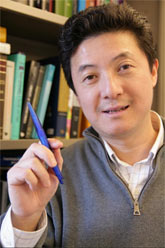
Handy Links
SLAC News Center
SLAC Today
- Subscribe
- Archives: Feb 2006-May 20, 2011
- Archives: May 23, 2011 and later
- Submit Feedback or Story Ideas
- About SLAC Today
SLAC News
Lab News
- Interactions
- Lightsources.org
- ILC NewsLine
- Int'l Science Grid This Week
- Fermilab Today
- Berkeley Lab News
- @brookhaven TODAY
- DOE Pulse
- CERN Courier
- DESY inForm
- US / LHC
SLAC Links
- Emergency
- Safety
- Policy Repository
- Site Entry Form

- Site Maps
- M & O Review
- Computing Status & Calendar
- SLAC Colloquium
- SLACspeak
- SLACspace
- SLAC Logo
- Café Menu
- Flea Market
- Web E-mail
- Marguerite Shuttle
- Discount Commuter Passes
-
Award Reporting Form
- SPIRES
- SciDoc
- Activity Groups
- Library
Stanford
Around the Bay
SIMES Researcher Shoucheng Zhang Awarded Europhysics Prize
SLAC and Stanford physicist Shoucheng Zhang was awarded the Europhysics Prize on Monday by the European Physical Society Condensed Matter Division. Zhang, a researcher at the Stanford Institute for Materials and Energy Research and a Stanford physics professor, was notified of this prize last Wednesday.
The Europhysics Prize is one of the more prestigious European physics awards. Zhang received this award for his theoretical prediction of the quantum spin Hall effect and topological insulators. He observed that top scientific awards usually involve the collaboration of many researchers not named in the prize.
"The best prizes are the reflection of the community of research," Zhang said. He received this award along with four scientists from other institutions.
Zhang also noted that the quantum spin Hall effect and topological insulators are very hot areas of research within condensed matter physics right now. He published a new paper on the topic just weeks ago.
"There are new discoveries coming out," he said. "This is a very broad effort within SLAC."
The quantum spin Hall effect is a novel phenomenon that occurs in very thin insulating materials, in which the quantum spin of each electron is aligned with the electron's motion. In other words, the electrons are surprisingly well organized in certain materials and will not dissipate heat as they move. This notion, first proposed only a few years ago, lead to the discovery of topological insulators.
Topological insulators do not conduct current on the inside bulk of the material but do so quite efficiently along the surface. Zhang and SLAC colleagues Yulin Chen, Ian Fisher, Aharon Kapitulnik and Zhi-Xun Shen found experimental evidence of this behavior in bismuth telluride last year. Physicists hope to use topological insulators to create more efficient conductors, perhaps leading to much faster computer chips and other advancements in electronics.
Zhang pointed out how these advancements boil down to understanding the fundamentals of electron behavior in different environments.
"Electrons can arrange themselves in very different states," he said. "We discovered a new way they organize themselves."
óJulie Karceski
SLAC Today, June 24, 2010
